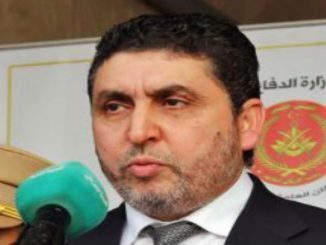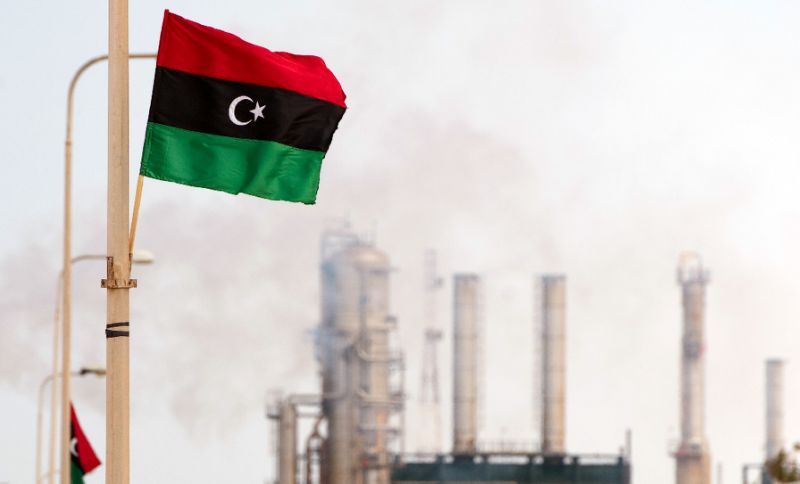
Aqila Saleh, the head of Tobruk’s House of Representatives (HoR), has promoted General Khalifa Haftar to Field Marshal through parliamentarians in the east Libya. Tobruk’s parliament asserted that the Libyan National Army’s control of oil facilities came following a mandate by the official institutions.
This comes days after his forces known a the Libyan National Army (LNA) took over oil facilities in eastern Libya from Petroleum Facilities Guards, a rival militia force allied to the UN-backed government in the capital, Tripoli.
Haftar is a military figure, backed by Tobruk government based in eastern Libya that refuses to recognize the U.N.-backed government, enjoys the support of several Arab nations, including Egypt, the United Arab Emirates, and Jordan, as well as western countries as France.
In addition, Haftar cast himself as the main opponent of the Islamist militias in Benghazi. However, Haftar has used the battle of Benghazi from “terrorists” as he named them as an opportunity, with full Egyptian support, to strengthen his forces.
As long as the battle in Benghazi escalates, albeit confined to some neighborhoods only, a justification existed for the support in arms, equipment, and training he received from Egypt and the UAE. But, in reality, part of this support extends also toward enabling Haftar’s troops to reach a level of effectiveness to reinforce his control over Eastern Libya and launch a sudden offensive to conquer the oil installations of the Gulf of Sidra.
The plan started as Haftar started extending his power in the east with the assistance of the Egyptian Armed Forces.
The first move, taken by Haftar in the east, was when the mayor of Benghazi, the largest city in eastern Libya, was replaced by Colonel Ahmed Larabi and the council was suspended. The appointment was made by the Chief of Staff of Gen. Haftar’s army Abdel Razek Al-Nazoury.
Later, Al-Nazoury took the second move when he replaced the mayor of Ajdabiya, Salim Jodran, brother of the head of the Petroleum Facilities Guard (PFG) Ibrahim. He was replaced by retired colonel Embarek Al-Manafi, as commander.
Al-Manafi is a supporter of Haftar’s Operation Dignity launched in May of 2014 to clear Libya of Islamists, which also includes the militia groups supporting the UN-backed Government of National Accord (GNA). Now Al-Nadhouri has acted a third time replacing the elected mayor of Al-Kufra by Colonel Saleh Al- Zarrouq.
In alignment with Haftar’s moves in the east, Egypt’s Armed Forces have been mandated to protect the joint borders from the sea to the Libyan-Sudanese borders.
Haftar requested the Egyptian army to protect Libyan/Egyptian borders from Imsaad, in the north, to the Libyan/Sudanese borders, as well as the maritime boundaries between both countries, “meaning that Haftar has granted Egypt unprecedented authority on Libyan territory,” said Libya Prospect.
Moreover, the oil tankers transporting Libyan petrol from Haftar-controlled regions in the east will be under Egypt’s authority in practice, the oil tankers will only be able to carry the oil and export unless Cairo approves.
After all these steps Haftar’s forces took control of oil ports in Libya as the majority of Libya’s oil exports went through the three terminals.
Two years ago, a militia known as Petroleum Facilities Guards controlled by Ibrahim Jadhran, the regional commander of the Petroleum Facilities Guards (PFG),seized the oil ports about two years ago.
Recently Jadran, who many Libyans see as a blackmailer of many governments, recognized the GNA’s authority in exchange for a large sum of money, and thus was posed to impede Haftar’s expansion toward the Gulf of Sidra.
However, the LNA attack has been largely successful and, as of September 12, Haftar is in control of most of Libya’s oil, having reportedly seized the ports of Ras Lanuf, Es Sidra, and Zueitina. While Jadran and his allies (first of all the GNA’s Minister of Defense Mehdi Bargathi) are preparing to launch a counter-attack, their hold on these installations has been severely compromised by Haftar’s operation.
Libya lives in a severe security chaos as a result of the struggle of power between the Islamic militias and other anti-Islamic militias in Benghazi (East) and Tripoli (West). There are two main competing governments in Libya, one in Tobruk, headed by Abdullah al-Thani, that roots out of Tobruk’s House of representatives(HoR) located at al Bayda city in the (East). The other government roots out of the General National Congress (GNC) based in the capital Tripoli (West) and led by Khalifa al-Gwhaill. Moreover, a third government has joined the struggle of power in Libya which the UN-backed government, known as the Government of National Accord (GNA), led by Fayez al-Serraj.



